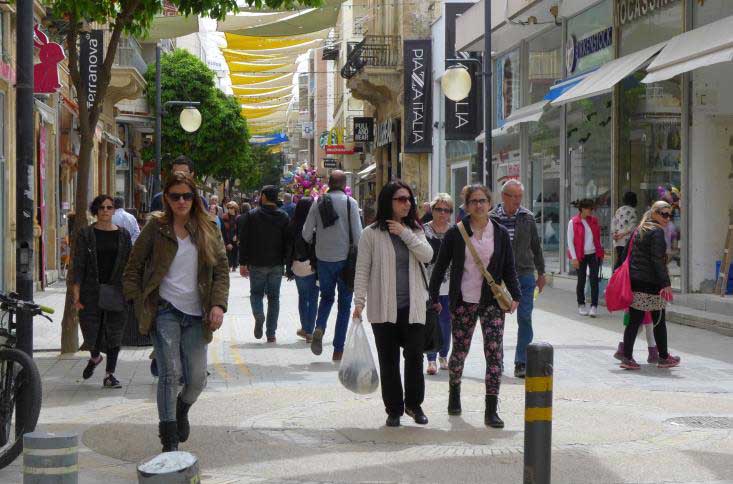Over 90 per cent want to see a cap on migration
The vast majority of Cypriots, more than two thirds, feel dissatisfied, anxious and angry about the general state of affairs in the country, while almost 70 per cent think that corruption is endemic.
These were among the key findings of the latest poll conducted by Cypronetwork on behalf of the Cyprus Broadcasting Corporation (Cybc), gauging public sentiment on a range of issues ahead of the 2023 presidential elections. Once again, independent candidate Nikos Christodoulides led the ratings by a wide margin.
Carried out from November 3 to 13, the survey polled 1,274 people aged over 18.
Asked what they ‘feel’ the most given the current situation in Cyprus, 28 per cent of respondents chose ‘disappointment’ while 26 per cent said ‘angst/concern’. A further 17 per cent said they feel ‘rage or frustration’.
The negative sentiments were slightly higher compared to a poll carried out prior to the 2018 elections.
Going into specifics, the pollsters asked respondents whether they thought Cyprus can become a country without corruption, or whether corruption will always exist. An overwhelming 69 per cent said corruption will always be around, and only 22 per cent believed it can be eradicated.
Significantly, back in March 2021 far fewer people thought that corruption will always exist – 52 per cent.
Views on migration were of particular interest. Respondents were asked to rate the state’s policy on migrants and asylum seekers. Here, 54 per cent said the policy was ‘less strict than what it should be’; 6 per cent that it is ‘stricter than what it should be’; and 24 per cent thought no policy exists whatsoever.
On whether there should be a cap on the number of migrants, 91 per cent agreed, and just 6 per cent said no. The former group – who agreed with a cap – were then asked whether the country has reached the limit in terms of how many migrants and refugees it can host. Here, 32 per cent said the limit has been reached, and 57 per cent that it has been exceeded.
The survey tried to assess people’s grasp of the migration situation, by asking the question ‘How many migrants and refugees are there today in Cyprus?’
To this, six per cent thought the number was up to 10,000; 15 per cent thought between 10,000 and 50,000; nine per cent said between 50,000 and 100,000; seven per cent guessed between 100,000 and 200,000; and five per cent surmised over 200,000.
On the barbed wire put up across parts of the buffer zone (from Akaki to Astromeritis), 42 per cent agreed with this measure, 24 per cent disagreed, 18 per cent had no opinion, and 16 per cent they neither agreed nor disagreed.
On the ‘international standing’ of Cyprus, when compared to a year before, just 14 per cent thought it has improved, while 37 per cent said it has grown weaker.
Regarding the ‘best solution’ to the Cyprus problem, the bi-zonal, bi-communal federation remained the most favoured option – 36 per cent, the same as in May 2021.
But at the same time, a marked increase occurred among those who thought two separate states was the best option – 18 per cent now, compared to just 4 per cent in May 2021. In addition, 19 per cent preferred a ‘unitary state’, and 13 per cent favoured the status quo.
A majority (53 per cent) still thought that the two communities should live together, 42 per cent that they should live apart. These results almost exactly mirrored those in a survey conducted before the last presidential elections five years ago.
On the issue of Varosha – the fenced-off part of Famagusta – respondents were asked whether Turkey’s settlement of the area can be averted. Views were split, with 40 per cent believing it can definitely/likely be stopped, and 38 per cent that it definitely/likely cannot be halted.
A plurality of respondents thought the Republic of Cyprus should join Nato – 43 per cent. But asked whether joining the alliance would ‘protect Cyprus from Turkey’, 42 per cent responded ‘a little/not at all’, while 38 per cent said ‘a great deal/enough’.
Coming to the issue of the presidential elections, just three months away, 66 per cent of respondents were sure who they’d vote for, and 25 per cent were unsure. The uncertainty among voters had increased slightly compared to 10 years ago.
Asked if differences exist among the presidential candidates, 43 per cent said ‘major differences’, 19 per cent said ‘small differences’, and 9 per cent thought ‘they are all the same’.
And 43 per cent said they would vote for the ‘lesser of evils’, while 41 per cent thought their preferred candidate was ‘the best’.
Nikos Christodoulides, formerly with the Disy party but now running as an independent, again led the rankings, with 30 per cent of respondents saying they’d vote for him. This compared to 30.5 per cent recorded in the October poll.
Disy leader Averof Neophytou came in second, at 20.5 per cent. And Akel-backed candidate Andreas Mavroyiannis got 17.5 per cent.






Click here to change your cookie preferences